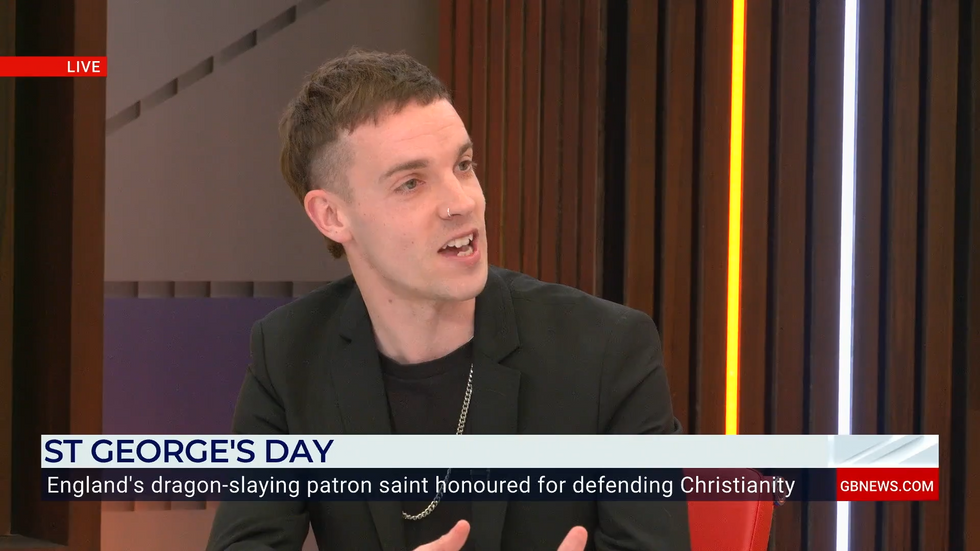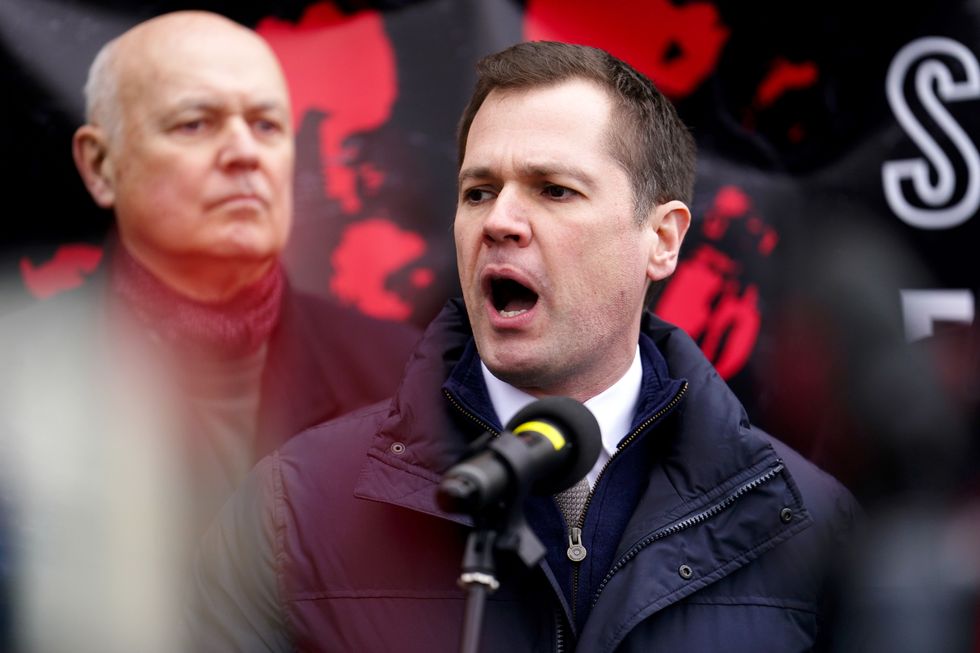St George's Day LIVE: Thousands take to streets to mark England's national day - 'Let's be proud!'
Downing Street raises the flag of St George as the PM leads celebrations
GB News
Join us for updates across the country as English people celebrate
Thousands of people will celebrate St George's Day across England and around the world today, with Prime Minister Sir Keir Starmer issuing a rallying cry to "be proud of our national identity".
Nottingham is expected to display the largest St George's flag in the heart of the city, alongside a celebration hosted by the Royal Society of St George Radford Branch event at Nottinghamshire’s oldest pub, the Ye Olde Salutation Inn.
The Welsh villages of Broughton & Saltney could also be marking St George's Day in style, with the tiny hamlets being named as the most English part of the UK in the 2021 Census.
Starmer kicked off St George's Day celebrations last night, praising contemporary and classical cultural English icons, as well as national cuisines such as Melton Mowbray pork pies and Lancashire Eccles cakes.
However, while the majority of people will be celebrating today, the Church of England has put back this year's feast day to Monday, April 28, due to a ruling that no saint's day can take place between Palm Sunday and the Second Sunday of Easter inclusive.
Alongside being the patron saint of England, St George is also celebrated in Albania, Bulgaria, Ethiopia, Greece, Georgia, Portugal, Romania, Syria, Palestine, Lebanon, Castile and León, Catalonia, Alcoi, Aragon, Genoa, and Rio de Janeiro.
FOLLOW BELOW FOR LIVE UPDATES THROUGHOUT THE DAY…
GB News presenter Ben Leo has been in Gravesham chatting to locals celebrating St George's Day.
Russell Palmer, a professional performer, spoke to the People's Channel about the importance of St George's Day as he jokes "I don't really answer to my actual name anymore".
Asked whether St George's Day has been forgotten in this day and age, he said: "St George is a symbol. People recognise the symbolism. I think we don't really focus on the Church or religion anymore."
Legend has it that St George rode into the ancient city of Silene in modern day Libya to battle a dragon to protect the citizens.
However, this story comes after the death of St George by several centuries.
Some historians believe the story comes from 9th Century artworks that may have been a metaphor of the battle between good and evil.
However, others believe the story was developed and popularised in the Middle Ages in a compendium of stories about saints' lives, The Golden Legend.

Gary Lineker and Sir Keir Starmer
PA
Residents in Nottingham have told GB News we should be "celebrating" English history on St George's Day.
Speaking to reporter Jack Carson, some residents said people are "hellbent" on destroying English heritage.
Others have called for a bank holiday, matching similar practices in Scotland and Northern Ireland.
Sir Keir Starmer hosted a St George’s Day Reception at Downing Street on Tuesday evening to celebrate the very best of England's music, culture and sport.
Later today at 8am the flag of St George will be raised atop of 10 Downing Street to celebrate England's patron saint, however the date is not a national holiday.
With that in mind, do you think our leaders do enough to celebrate Englishness?
GB News Members can have their say by voting in the poll here.
 Samuel Sweek said being proud of where you are from is nonsensical GB NEWS
Samuel Sweek said being proud of where you are from is nonsensical GB NEWSA tense row kicked off on GB News as commentator Samuel Sweek argued against the notion of national pride on St. George’s Day.
He was criticised by Eamonn Holmes and political commentator Charlie Downes, with the latter suggesting his point of view was "pervasive."
Sweek said: "St George’s Day doesn’t float my boat There’s much to be taken from our country and people from England have done remarkable things over the years. For me, I was born in England. That’s not an achievement."
Downes hit back, saying: "Nationhood gives each place a distinct flavour and texture and the liberal mind fears difference because its fundamental principle is equality.
"When you have distinct nations and distinct peoples with distinct identities and languages and so-on, the liberal mind sees that as a source of division. I don’t. I see it as a source of beauty."
Residents in England’s most English town have told GB News that they feel "embarrassed" to celebrate St George's Day.
At most three-in-10 locals identified as English only, with an additional 16.9 per cent also saying they are both English and British at Canvey Island in Essex.
"Englishness is really important,” pensioner Terry White told GB News. “I’d do something for St George’s Day but people are too scared.”
Eamonn Holmes has demanded a national holiday to mark St. George’s Day.
The GBN Breakfast star said: "Today is April 23, that makes it St. George’s Day."
“If you’re in England, if you live in England, this should be your day. This should be your national holiday. But it isn’t."
St George was born in the 3rd century AD in Cappadocia in what is now modern day central Turkey.
While many images depict him as a knight in shining armour, he was actually a Roman army officer and was martyred for his Christian faith.
St George was canonised in 494 by Pope Gelasius, who claimed he was one of those "whose names are justly revered among men but whose acts are known only to God."
Despite not visiting England, his reputation for virtue and holiness spread across Europe. He was known to be popular with King Edward I, who reigned from 1272 to 1307.
King Edward III (1327-77) also took an interest in the saint and owned a relic of his blood.

Shadow justice secretary Robert Jenrick
PA
The Shadow Justice Secretary Robert Jenrick has said that English people should "prize our heritage" in his St George's Day message for GB News.
He said: "I am deeply proud to be both English and British. My upbringing was in provincial England and being English is important to me. It is my home.
"That’s why I have always celebrated St George’s Day. I remember my parents, imbued with what you could call an old-fashioned working-class patriotism, used to take me to the St George’s Day parades in Black Country towns like Dudley. They were replete with flags, knights on horses and a few pints in pub gardens."
The Prime Minister used his St George's Day Downing Street address to "wrench the flag" from those who wish to "divide" us.
Starmer said: "It was the aftermath of the riots that showed what it means to be English. It marked the coming together of a country. People who got together the morning after, all across Britain with shovels, brooms, and brushes, to clean up their communities.
"Rebuilding walls, repairing damage and it’s in that spirit that we reclaim our flag and that was incredibly uplifting to go from rioting to people coming out to do what they could for our country.
"So that’s what we must do for our country, for English decency, honour and fairness. Wrench it out of the hands of those who want to divide this nation and reclaim it for good."